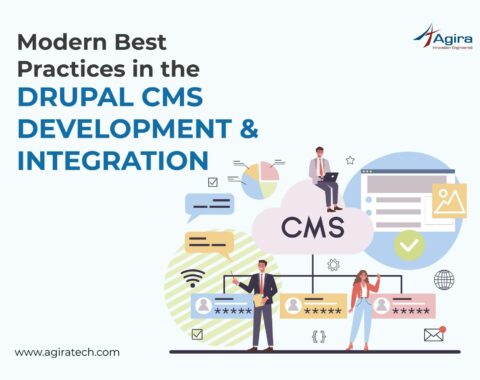Table of Contents
When it comes to Full stack development, at our company we prefer MEAN stack for this because of its abundance benefits. Just a few days ago we were asked by a client why we prefer MEAN stack for developing their enterprise application. And many of you might have the same question. In this blog, we discuss why we prefer MEAN stack especially for developing Enterprise applications. Enterprise software or Enterprise application software(EAS) can be defined as a software that is used to satisfy the needs of an organization rather than the individual users. The definition clearly implies that the enterprise applications are complex and critical. They should definitely be robust and highly scalable and meet stringent requirements. So while building enterprise applications for our clients, we build them in a way that the applications satisfy the following parameters.
- Scalability
- Security
- User friendliness
- High performance
- Maintainable
To build highly scalable and robust applications MEAN stack is the first choice of many companies and being the experts in MEAN stack development we strongly believe in using MEAN stack for building robust and scalable enterprise applications.
MEAN represents a collection of javascript technologies that concur well together. Now let’s see what MEAN stack is and what makes MEAN stack most preferred for building enterprise applications.
MEAN:
M in MEAN stands for “MongoDB“, E for “Express.js“, A for “AngularJS” and N for “Node.js”
MongoDB:
MongoDB is an open source, highly flexible document database. We call it highly flexible since it stores data in JSON kind of documents. The fields can be different from document to document and we can also change the data structure. Accessing and analyzing the data is made easy with MongoDB.
Express:
Express is a feature-rich node.js framework. Many features in express are available as plugins which make the express relatively minimal.
Angular:
AngularJS is an Open-source Javascript framework. It is written in Javascript. AngularJS is develope and maintain by global giant Google. It is develope to create client-side applications. Within no time AngularJS emerged as a well-liked Javascript Framework. It extends HTML with new attributes, and it should be added to an HTML page using a <script> Tag. AngularJS is one of the most popular Javascript MVC frameworks.
( MVC is a software design pattern use to organize the programming logic into three layers.
Model- Lowest level pattern for maintaining data.
View- For displaying data to the user.
Controller- Code that controls the interaction between the above two.)
Node:
NodeJS cannot be consider as a framework. It is a runtime or environment. It is an open source platform built on Javascript runtime. Through Super-fast interpreter that runs on Chrome browser, NodeJS enables event-driven programming.
Why MEAN stack is The Most Preferred for Developing Enterprise Application:
As discussed earlier Enterprise applications are big and complex. Scalability, Performance, User-friendliness, security should be core features of an enterprise application. So let us see how MEAN is efficient in building these kinds of applications
Scalability:
Enterprise applications should have the capacity to handle growing amount of work and increased load. So for the enterprise level applications, scalability is of paramount importance. The Single thread asynchronous architecture of node.js improves the scalability and performance of the application. Instead of using mutexes, thread, and synchronization it uses queues, events in order to improve the scalability of the application.
The traditional servers such as Apache HTTP server handle the requests by creating the only limited number of threads. But this is not in the case of Node.js. The single threaded model and event looping will let the server respond in a non-blocking way.
MongoDB provides both cluster scale as well as data scale through features like mongo sharding, mongo replica (ref mongo scale)
Performance:
Node js is built on Google Chrome’s V8 JavaScript Engine, it’s library executes code very fastly. Even though node runs in a single thread, Node’s cluster module allows you to easily launch a whole cluster of Node child processes to better handle the load (ref node cluster)
MongoDB features like indexing, Memory and the MMAPv1 Storage Engine Database Profiling, text search, map-reduce help to achieve high performance in read-write operations.(ref mongo performance)
Security:
MongoDB provides various features, such as authentication, access control, encryption, to secure your MongoDB deployments. MongoDB also provides the Security Checklist for a list of recommended actions to protect a MongoDB deployment. Also, refer mongo security features.
Node js community provides a number of inbuilt features and packages to prevent security issues like brute force attack( by the help of ratelimiter package).
Also, refer express js security best practices which will cover all well-known web vulnerabilities.
User-friendly:
The Application layer and data layer manipulate the data and after manipulating data is display in presentation layer with different styles. MEAN stack uses angularjs for front-end development which also a javascript framework which resides in the presentation layer. Along with angularjs we can use material design (we can build a rich set of look and feel in web pages in a responsive manner).
Maintenance:
We need to upgrade our app services based on the change of technology, for example, previously all enterprises are supported only through the web, but nowadays they need to create mobile apps for all mobile platform also Voice services also emerging, so Enterprise should support these changes.
Angular, Node and Mongo DB all have a large community support individually which have clear release note and support. The releases are based on the tech challenges and changes.
- Nodejs Maintenance info
- Mongo release notes info
- Angular release notes info
- Express release notes info
MEAN stack is more flexible to use for both front and back development and deployment. These things lead us to use MEAN in Enterprise Application(EAS) with which we have provided right solutions to enterprises. Follow Agiratechnologies for more on MEAN stack web development.
Other useful reads on MEAN stack application development:
https://www.mongodb.com/mongodb-scale
https://nodejs.org/api/cluster.html
https://docs.mongodb.com/manual/administration/analyzing-mongodb-performance/











